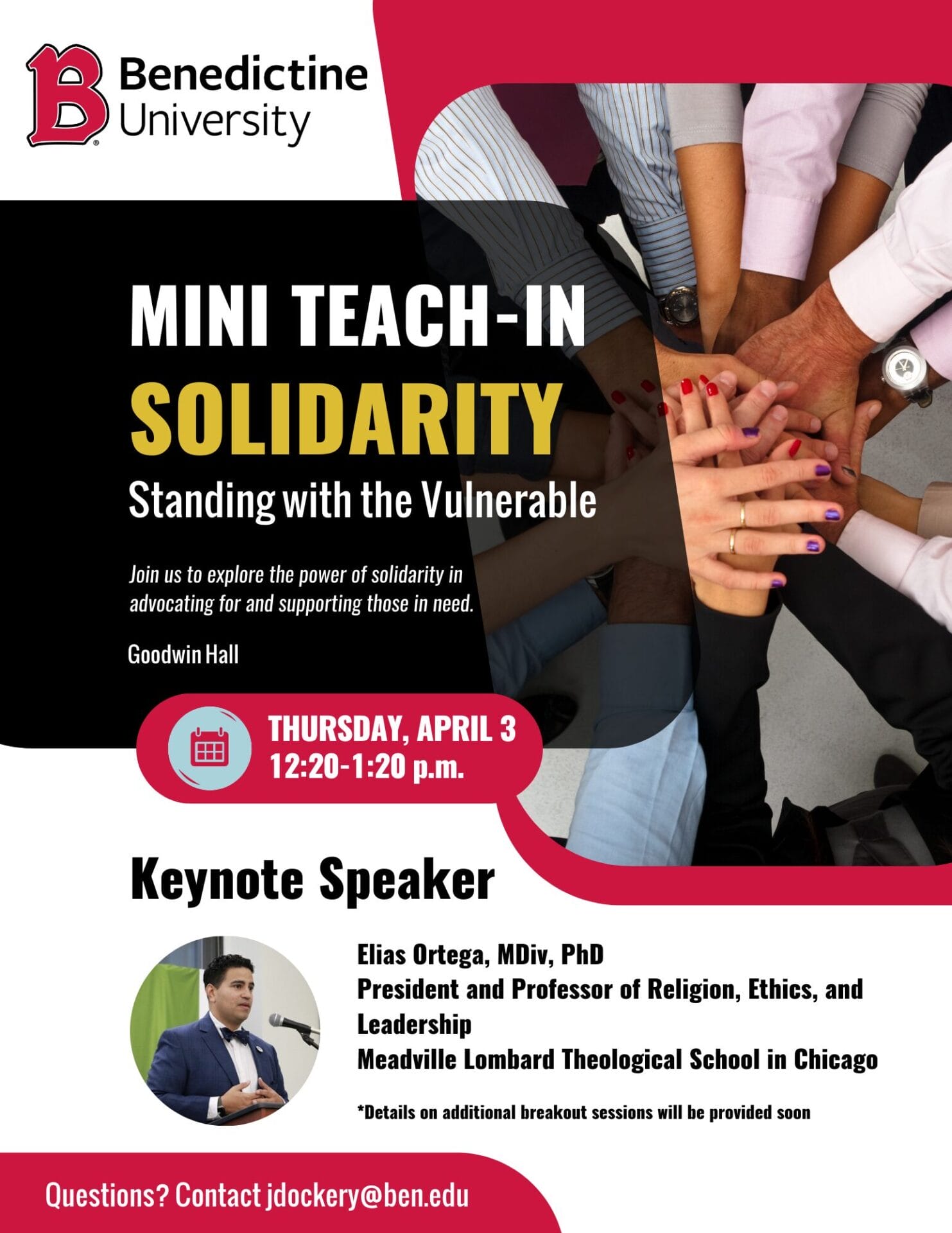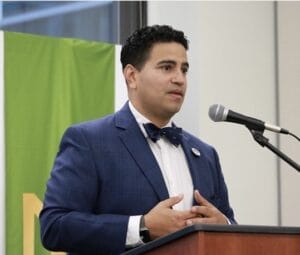
Mini Teach-In
Mini Teach-In on Solidarity
Standing with the Vulnerable
Join us to explore the power of solidarity in advocating for and supporting those in need
Thursday, April 3 | 12:20-1:20 p.m. | Goodwin Hall
Keynote Speaker – Elías Ortega, MDiv, PhD

(Students, Staff, and Faculty only)
Elías Ortega, MDiv, PhD, President and Professor of Religion, Ethics, and Leadership, Meadville Lombard Theological School in Chicago
Dr. Elías Ortega is the President and Professor of Religion, Ethics, and Leadership at Meadville Lombard Theological School in Chicago, a position he has held since July 2019. An Afro-Latino scholar, Dr. Ortega is an interdisciplinary educator, social justice activist, and Unitarian Universalist lay leader. He earned his MDiv and PhD from Princeton Theological Seminary and holds a BA in Communication Arts & Sciences, Philosophy, and Religion from Calvin College.
Before joining Meadville Lombard Theological School, Dr. Ortega served as Associate Professor of Social Theory and Religious Ethics at Drew University Theological School where he contributed to initiatives in digital humanities. There, he also led civic engagement projects and Title IX compliance. His teaching and research focus is on religious ethics, cultural sociology, Africana studies, and Latinx cultural studies.
A committed advocate for justice-making and civic engagement, Dr. Ortega has played key roles in Unitarian Universalist initiatives, including serving on the UUA’s Commission on Institutional Change, co-chairing the UU Legislative Ministry of New Jersey’s Dismantling Racism Group, IL Poor Peoples Campaign Coordinating Committee Member, and the Bridge Interfaith Alliance Steering Committee of DuPage. He co-founded the Drew Freedom School Initiative to train community organizers in non-violent resistance and has supported numerous advocacy organizations addressing mental health, juvenile justice, and immigrant rights.
Dr. Ortega’s leadership at Meadville Lombard reflects his vision for theological education that integrates intellectual rigor with spiritual practices to prepare leaders for a complex, multicultural world.
Concurrent Sessions
Confronting Critical Issue of Learning and Teaching Today | Kindlon 134
This interactive session is based on a chapter of a book by Ovid Wong, PhD. The session will present sample education legislation such as the Bilingual Education Act, Title IX, Every Student Succeeds Act, etc. in the context of equity and accountability. The audience will use smart phones to access quick excursions of learning the importance of legislation.
Facilitated by: Dr. Ovid Wong
Session type: Speaker
Higher Education Behind Bars| Kindlon 163
This session explores the challenges and achievements of higher education in the U.S. prison system. Dr. Amanda Bequette, director of the Saint Louis University Prison Education Program, will lead us in a discussion of educational opportunities for incarcerated individuals and prison employees. According to Catholic social teaching, caring for the imprisoned is a corporal work of mercy. In the age of mass incarceration, colleges and universities can provide experiences and resources that honor the dignity of all persons.
Facilitated by: Dr. Amanda Bequette (Saint Louis University Prison Education Program)
Moderated by: Dr. Steven Burgess
Catholic Teaching & Immigration: Welcoming the Stranger| Kindlon 161
The Catholic Church teaches that we are to care for the most vulnerable in society. This session will share what Catholic teaching is regarding immigration and how to care for our immigrant siblings (especially in this time of misinformation and mistreatment of immigrants). Participants will hear from a guest speaker who works directly with immigrants and will share what we are called to do as people of good will.
Facilitated by: Carrie Ankeny and Representatives from Catholic Charities
Session type: Panel Discussion
Being Vocal: Songs of Protest, Community, and Solidarity | Goodwin 212
The presenters will provide a brief overview of protest songs from the past and present, including music that was written about war, famine, politics, religion, social justice, the environment, and other causes. Attendees will have an opportunity to engage in discussion and share examples of other protest songs that resonate with them. The presenters will lead an informal group-sing, during which attendees will learn and sing songs that are representative of this genre. No formal music experience is needed to participate. If you have heard music before, this session is for you!
Facilitated by: Dr. Cheryl Heinz and Dr. Allen Legutki
Session type: Workshop
The Paris Agreement and Solidarity with Environmental Migrants | Goodwin 211
This panel will examine solidarity with those most harmed by climate change from the perspectives of public health (Dr. Kauth), international relations (Dr. Ostrow), and moral philosophy (Dr. Tracey), with emphasis on U.S. policy and the Paris Agreement.
Facilitated by: Dr. Martin Tracey, Dr. Jean-Marie Kauth, Dr. Joel Ostrow, and Mya Mohammed
Session type: Panel Presentation
Healthcare in Palestine | Goodwin 312
The topic of this panel presentation, Healthcare in Palestine, reflects the Teach-In theme, Solidarity: Standing with the Vulnerable, because the people in Palestine (specifically, people in Gaza) are vulnerable and face oppression and fear with every moment, especially after the event of October 7, 2023. Military checkpoints, restrictions on the supply chain, and trouble accessing procedures (e.g., medical) are some of the issues they face. The people of Palestine face severe shortages of resources and security, but we can act as engaged citizens by raising awareness and advocating for change, even through conversations about this ongoing crisis. The panel will also reflect on what they have been doing to support the people of Palestine for the past almost year and a half. Session participants will engage in a short activity followed by a brief presentation on the history and issues, concluding with an open discussion and Q & A session.
Facilitated by: Sana Arbi, Zoha Quadri, Sara Hasan, Aafreen Ahmed, and Maliha Syeda
Session type: Panel
Palestine in Latin America | Kindlon 135
The focus of this session is a discuss on Latin America’s history and solidarity movements in support of a free Palestine. In particular, the speaker will address how Latin American leaders and activists shine a spotlight on the ways in which geopolitical interests have been instrumentalized to thwart international law and human rights justice efforts in the region.
Facilitated by: Elias Ortega
Session type: Keynote Speaker
The Economics of Immigration: Navigating the Ethical Dimensions | Goodwin 313
In the current political climate, with rising anti-immigrant rhetoric and the loss of safe spaces such as schools and churches, it is important to shed light on the crucial role immigrants play in shaping the economy, their contribution to the labor market, innovation, and fiscal stability. We hope to help participants engage in informed discussions using knowledge from the field of economics and guided by ethical parameters developed through applied ethics and Catholic social teaching. The forum will allow time for participants to discuss and listen.
Facilitated by: Dr. Rob Rebman & Dr. Florina Salaghe
Session type: Roundtable
If you have any questions or would like to be involved in planning, please contact:
Julie Dockery, EdD, Chief Diversity Officer
[email protected]
